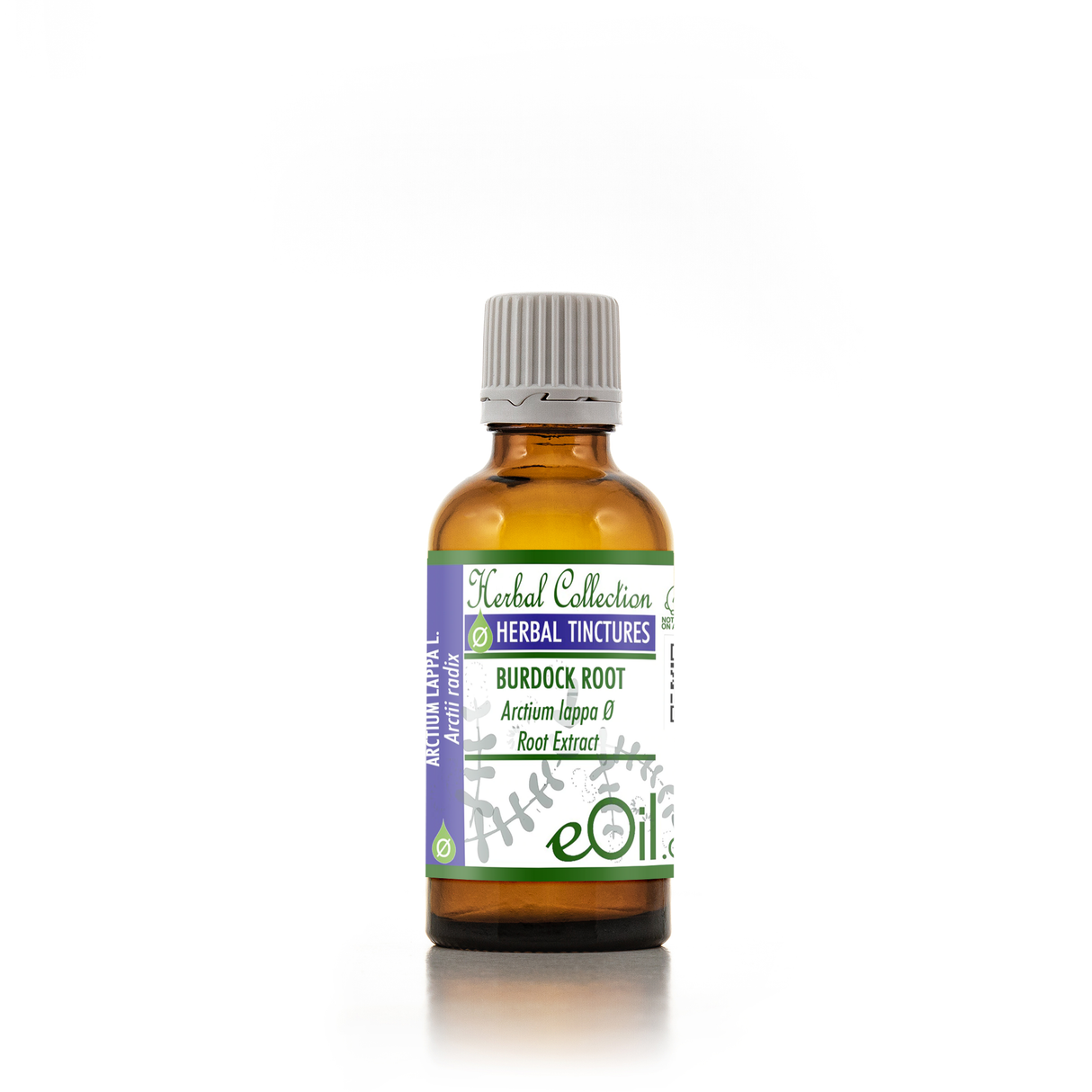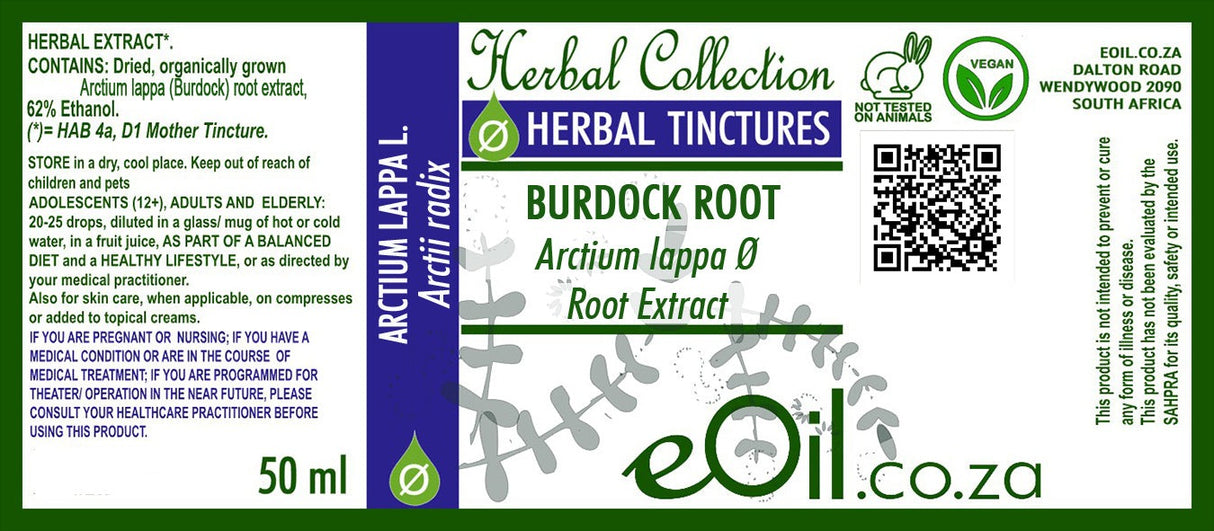Burdock root - Liquid Herbal Extract
Burdock root - Liquid Herbal Extract - 50 ML is backordered and will ship as soon as it is back in stock.
Description
Description
Understanding Mother Tinctures & Glycerines
Clear your skin from the inside out.
Our concentrated Burdock Root Tincture is the ultimate herbal "blood purifier" (alterative). Derived from the deep taproot of the Arctium lappa plant, this herb is famous for its ability to clear chronic skin conditions by addressing the root cause: toxins in the blood and liver.
How does it work? Burdock is a powerhouse detoxifier. It stimulates the body's natural elimination channels—the liver, kidneys, and lymphatic system—to flush out stagnant toxins that often manifest as skin problems.
Key Benefits & Uses:
The #1 Herb to help with Chronic Skin Issues: This is its most celebrated use. By helping "cleaning the blood," Burdock is the primary herbal remedy for managing chronic, inflammatory skin conditions, specifically acne, eczema, psoriasis, and boils.
Helping with Deep Lymphatic & Liver Detox: It helps to stimulate a sluggish liver and move stagnant lymph. This makes it a fantastic tonic for a spring detox or for anyone feeling "congested" and sluggish.
Digestive Bitter: As a naturally bitter herb, it helps stimulate digestive juices (bile), improving digestion and nutrient absorption.
Prebiotic Support: Burdock is rich in inulin, a prebiotic fiber that supports healthy gut bacteria (which is also linked to clear skin).
How to Use: Take 15-30 drops in a small glass of water, 2-3 times daily.
Tip: For skin issues, consistency is key. It acts slowly but deeply. Use for at least 4-6 weeks for best results.
Important Cautions:
Do NOT use if pregnant (it can stimulate the uterus).
Caution if you have diabetes (it can lower blood sugar).
TRADITIONALLY USED FOR
Burdock root (Arctium lappa) is a versatile plant used for centuries in various traditional medicine systems, particularly in Asia and Europe.
Known for its many beneficial properties, burdock root has been used to address a range of health issues.
Here are some of its key benefits, properties, and traditional uses:
- Anti-inflammatory properties: Burdock root is known for its anti-inflammatory effects, which can help alleviate symptoms associated with arthritis, gout, and other inflammatory conditions.
- Antioxidant properties: Rich in antioxidants like quercetin and luteolin, burdock root can help protect the body from oxidative stress and damage caused by free radicals.
- Blood purifier: Traditionally, burdock root has been used as a blood purifier, helping to cleanse the bloodstream of toxins and improve circulation.
- Diuretic effects: Burdock root acts as a natural diuretic, promoting the elimination of excess fluid from the body. This can help reduce swelling and support kidney function.
- Digestive health: Burdock root is high in fiber and can help support healthy digestion, relieving constipation and promoting regular bowel movements.
- Skin health: Traditionally, burdock root has been used to treat skin conditions such as eczema, psoriasis, and acne due to its anti-inflammatory and antibacterial properties.
- Immune system support: Burdock root may help strengthen the immune system by stimulating white blood cell production and supporting overall immune function.
- Cancer-fighting properties: Some studies suggest that burdock root contains compounds that may have anti-cancer properties, although more research is needed to confirm these findings.
- Aphrodisiac effects: In some traditional medicine systems, burdock root has been used as an aphrodisiac to increase libido and improve sexual function.
- Liver health: Burdock root has been used to support liver health, aiding in detoxification and improving overall liver function.
It is important to note that while burdock root has many potential benefits, more research is needed to fully understand its effects and to establish appropriate dosages.
As with any herbal remedy, it is essential to consult with a healthcare professional before using burdock root, especially if you are pregnant, nursing, or taking medications.
DESCRIPTION
Burdock is a genus of biennial plants from the Asteraceae plant family. Once native to Europe and Asia, burdock is now found worldwide and is cultivated for a variety of uses. Burdock is most commonly cultivated for its taproot which can be eaten as a root vegetable, and is a popular ingredient in East Asian cuisine. Burdock root is a popular flavouring agent for a variety of dishes and is used in herbal teas, alcoholic and non alcoholic beverages due to its crisp, sweet, earthy and pungent flavour.
INFORMATION
Source : http://www.wikiphyto.org/wiki/Bardane
Reference on http://www.wikiphyto.org
Translation in English by Google Translate (go to the page of the source linked | on Chrome cellphones go on the 3 dots on the top right and select translate in your preferred language | on laptop right click your mouse and select option translate when hoovering on the page
plant name
Burdock, Great burdock , Grateron , burdock (English)
International Latin denomination
Arctium majus Bernh. or Lappa major Gaertn. = Arctium lappa L.
botanical family
Asteraceae
Description and habitat
- Robust, biennial plant with large heart-shaped leaves (50 x 30 cm) that can reach a maximum height of 1.5 m
- Heads with red-purple tubular flowers, with very hanging bracts in the form of curved hooks (mode of seed dispersal)
- Uncultivated land, mainly limestone and along the roads of all of Europe except the Mediterranean regions
History and tradition
- Formerly used in the stimulation of hair growth (theory of signatures because of the hairiness of the plant)
- The ancients used it as a depurative, diuretic, sudorific (diaphoretic), anti-rheumatic, and even in the treatment of syphilis [1]
- The burdock flower head is at the origin of the invention of the self-gripping band (Velcro®) invented in 1948 by Georges de Mestral
- Chinese pharmacopoeia uses burdock fruit to dissipate wind and heat
Parts used
- Roots
Dosage forms available
- Underground Part Tincture
- EPS of underground part
- Fluid extract
Usual dosages
Composition
Main components of the plant
- Inulin : 27 to 45%
- Mucilages ( xyloglucans and bitter xylans ), i.e. a total of 69% carbohydrates
- Phenolic acids : 1.9 to 3.6% caffeic acid , chlorogenic acid , isochlorogenic acid , caffeoylquinic acid
- Linear or cyclic polyunsaturated compounds, polyenes and polyins : arctinones , arctinols , arctinal , arctic acid or aretic acid , costic acid
- Lappaphenes : addition of arctinal to a sesquiterpene lactone from the guaianolide group ( dehydrocostuslactone )
- Essential oil 0.06 to 0.18%
- Sterols , triterpenes , guanidinobutyric acid
- Fruits and seeds: lignans : arctigenin , arctiopicrin in leaves, germacranolide
Main components of buds or young shoots
Main components of essential oil
Properties
Plant properties
- Depurative, skin detoxifier [2] , diaphoretic, diuretic, sudorific
- Anti-inflammatory [3] by arctigenin , action on the production of NO and the secretion of pro-inflammatory cytokines (TNF-alpha, IL-6) [4]
- Choleretic (stimulation of hepatic and biliary functions) by sesquiterpene lactones
- Hypolipidemic, antiatheromatous [5]
- Cardiovascular protection, improves endothelial function in rats fed a high-fat diet [6]
- Kidney protection against cadmium toxicity [7]
- Antidiabetic ( lignans ) [8] , hypoglycemic by inhibition of alpha-glucosidase [9] , increases tolerance to carbohydrates ( guanidinobutyric acid ?)
- Bacteriostatic, polyenes and polyins are antimicrobial and antifungal in vitro (gram + bacteria)
- Antioxidant [10] , with greater activity of the aqueous extract [11] and anti-inflammatory [12]
- Hepatoprotector (carbon tetrachloride and acetaminophen) [13] , (alcohol) [14]
- Improves sperm quality in rodents [15]
- Immunostimulant by polysaccharides [16]
- Weak antiaggregating effect, platelet-activating factor (PAF) antagonist [17]
- Fruit arctigenin is a PAF antagonist, inhibits cAMP-phosphodiesterase, and is anti-proliferative [18] , tested in pancreatic cancer [6]
- Aphrodisiac, improves sexual behavior and fertility in rats [19]
Bud properties
Properties of essential oil
Directions
Indications of the whole plant (phytotherapy)
- Toxic and toxin overloads, hypercholesterolemia, hyperlipemia, atherosclerosis
- Dermatosis, furunculosis, acne, abscess, anthrax
- Eczema, psoriasis
- Paronychia, varicose sores, pilosebaceous infections
- In popular medicine: gallstones and kidney stones, gout, rheumatism
- Dry seborrhea of the scalp and stimulation of hair growth (theory of signatures due to the hairiness of the plant)
Indications of the bud (gemmotherapy)
Specific indications of essential oil (aromatherapy)
Known or suspected mode of action
- Inulin, a polysaccharide ( fructan ), is an osmotic diuretic: filtered by the renal glomerulus, it increases the osmotic pressure of the tubular fluid
- Detoxifying effect of sesquiterpene lactones
- Use the fresh plant, because it has been described a loss of 90% of polyunsaturated derivatives by drying (sensitivity to oxidation of polyenes and polyins )
Usual formulations
Regulations
- French Pharmacopoeia list A (leaf, root)
Possible side effects and precautions for use
- Potential but rare allergic risks ( Asteraceae family )
- Theoretical risks of interactions with anticoagulants [17]
Bibliographic references
- Aller↑ Cazin FJ. Practical and reasoned treatise on native medicinal plants. Ed. de l'Envol. Mane. 1997. Identical reissue of the 1868 original.
- Aller↑ Chan YS, Cheng LN, Wu JH, Chan E, Kwan YW, Lee SM, Leung GP, Yu PH, Chan SW. A review of the pharmacological effects of Arctium lappa (burdock). Inflammopharmacology. 2011 Oct;19(5):245-54. doi: 10.1007/s10787-010-0062-4. PMID 20981575
- Aller↑ Maghsoumi-Norouzabad L, Alipoor B, Abed R, Eftekhar Sadat B, Mesgari-Abbasi M, Asghari Jafarabadi M. Effects of Arctium lappa L. (Burdock) root tea on inflammatory status and oxidative stress in patients with knee osteoarthritis. Int J Rheum Dis. 2016 Mar;19(3):255-61. doi: 10.1111/1756-185X.12477. PMID 25350500
- Aller↑ Zhao F, Wang L, Liu K. In vitro anti-inflammatory effects of arctigenin, a lignan from Arctium lappa L., through inhibition on iNOS pathway. J Ethnopharmacol. 2009 Apr 21;122(3):457-62. PMID 19429312
- Aller↑ Wang Z, Li P, Wang C, Jiang Q, Zhang L, Cao Y, Zhong W, Wang C. Protective effects of Arctium lappa L. root extracts (AREs) on high fat diet induced quail atherosclerosis. BMC Complementary and Alternative Medicine 2016, 16:6 (8 January 2016) Full text abstract
- Aller↑ Lee YJ, Choi DH, Cho GH, Kim JS, Kang DG, Lee HS. Arctium lappa ameliorates endothelial dysfunction in rats fed with high fat/cholesterol diets. BMC Complement Altern Med. 2012 Aug 6;12:116. doi: 10.1186/1472-6882-12-116. PMID 22866890
- Aller↑ Suliman Al-Gebaly A. Ameliorative Effect of Arctium lappa Against Cadmium Genotoxicity and Histopathology in Kidney of Wistar Rat. Pak J Biol Sci. 2017;20(6):314-319. doi: 10.3923/pjbs.2017.314.319. PMID 29023056
- Aller↑ Xu Z, Wang X, Zhou M, Ma L, Deng Y, Zhang H, Zhao A, Zhang Y, Jia W. The antidiabetic activity of total lignan from Fructus Arctii against alloxan-induced diabetes in mice and rats. Phytother Res. 2008 Jan;22(1):97-101 PMID 17724763
- Aller↑ Miyazawa, Mitsuo & Yagi, Nobuo & Taguchi, Katsuya. (2005). Inhibitory Compounds of .ALPHA.-Glucosidase Activity from Arctium lappa L.. Journal of Oleo Science. 54. 589-594. 10.5650/jos.54.589. [1]
- Aller↑ Predes FS, Ruiz AL, Carvalho JE, Foglio MA, Dolder H. Antioxidative and in vitro antiproliferative activity of Arctium lappa root extracts. BMC Complementary and Alternative Medicine 2011, 11:25 (23 March 2011) [2]
- Aller↑ Pin-Der Duh. Antioxidant activity of burdock (Arctium lappa Linnaeus): Its scavenging effect on free-radical and active oxygen Journal of the American Oil Chemists' Society, Volume 75, Number 4, 455-461 full text
- Aller↑ Chun-Ching Lin, Jer-Min Lin, Jeng-Jer Yang, Shu-Chuan Chuang, Takashi Ujiie. Anti-inflammatory and Radical Scavenge Effects of Arctium lappa. The American Journal of Chinese Medicine (AJCM), Volume: 24, Issue: 2(1996) pp. 127-137
- Aller↑ Song-chow Lin. Hepatoprotective Effects of Arctium Lappa on Carbon Tetrachloride- and Acetaminophen-Induced Liver Damage. The American Journal of Chinese Medicine (AJCM), Volume: 28, Issue: 2(2000) pp. 163-173
- Aller↑ Lin SC, Lin CH, Lin CC, Lin YH, Chen CF, Chen IC, Wang LY. Hepatoprotective effects of Arctium lappa Linne on liver injuries induced by chronic ethanol consumption and potentiated by carbon tetrachloride. J Biomed Sci. 2002 Sep-Oct;9(5):401-9. PMID 12218354
- Aller↑ Ahangarpour A, Oroojan AA, Heidari H, Ghaedi E, Taherkhani R. Effects of Hydro-alcoholic Extract from Arctium lappa L. (Burdock) Root on Gonadotropins, Testosterone, and Sperm Count and Viability in Male Mice with Nicotinamide/ Streptozotocin-Induced Type 2 Diabetes. Malays J Med Sci. 2015 Mar-Apr;22(2):25-32. PMID 26023292
- Aller↑ A. Kardo ová, A. Ebringerová, J. Alföldi, G. Nosál'ová, S. Fra ová, V. Híbalova. A biologically active fructan from the roots of Arctium lappa L., var. Hercules. International Journal of Biological Macromolecules, Volume 33, Issues 1-3, November 2003, Pages 135-140 [3]
- ↑ Aller à :17.0 and 17.1 Iwakami S, Wu JB, Ebizuka Y, Sankawa U. Platelet activating factor (PAF) antagonists contained in medicinal plants: lignans and sesquiterpenes. Chem Pharm Bull (Tokyo). 1992 May;40(5):1196-8. PMID 1394633
- Aller↑ T. Matsumoto, K. Hosono-Nishiyama, H. Yamada. Antiproliferative and Apoptotic Effects of Butyrolactone Lignans from Arctium lappa on Leukemic Cells. PlantaMed 2006; 72(3): 276-278. PMID 16534737
- Aller↑ Cao J, Zhang P, Xu C, Huang T, Bai Y, Chen K. Effect of aqueous extract of Arctium lappa L. (burdock) roots on the sexual behavior of male rats. BMC Complementary and Alternative Medicine 2012, 12:8 (1 February 2012) Abstract: [4] , full text in pdf [5]
- Bruneton J. Pharmacognosy, Phytochemistry, Medicinal Plants. Ed. Tec and Doc. 1997. p. 150
- Wichtl Max, Anton Robert. Therapeutic plants: Tradition, officinal practice, science and therapy. Ed. Tec & Doc. Cachan. 1999. p. 67
CAUTION
Store in a cool, dry place, away from light. Keep tightly closed, away from the reach of Children and pets.
Do not exceed the daily dose.
This product is not intended to prevent or cure any form of illness or disease.
If you are pregnant or nursing ; If you have a medical condition or are in the course of medical treatment ; If you are programmed for theater/operation in the near future, please consult your healthcare practitioner before using this product.
This product cannot replace a varied and balanced diet and a healthy lifestyle.
This product has not been evaluated by the SAHPRA for its quality, safety or intended use.
For More Information please check our General Safety Herbal products Page

Burdock root - Liquid Herbal Extract - 50 ML is backordered and will ship as soon as it is back in stock.





